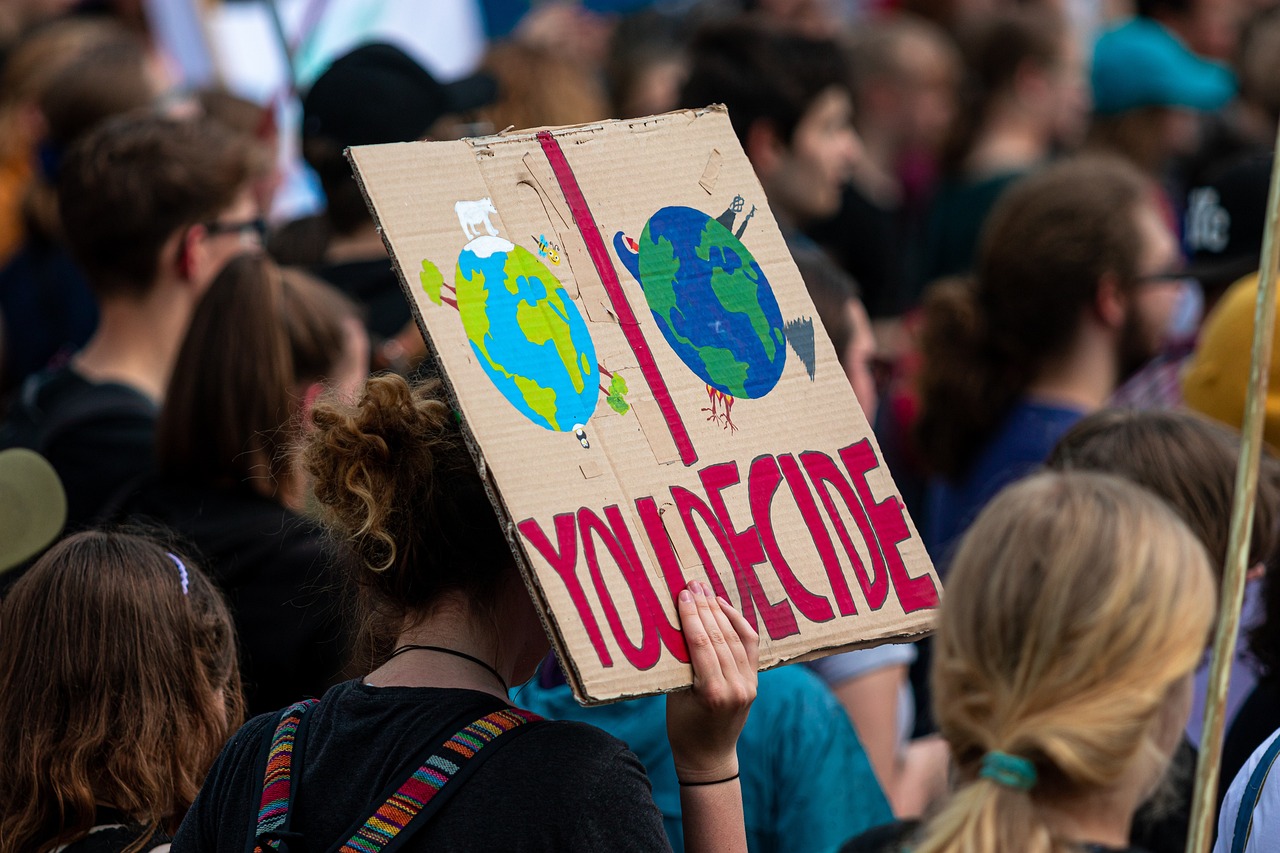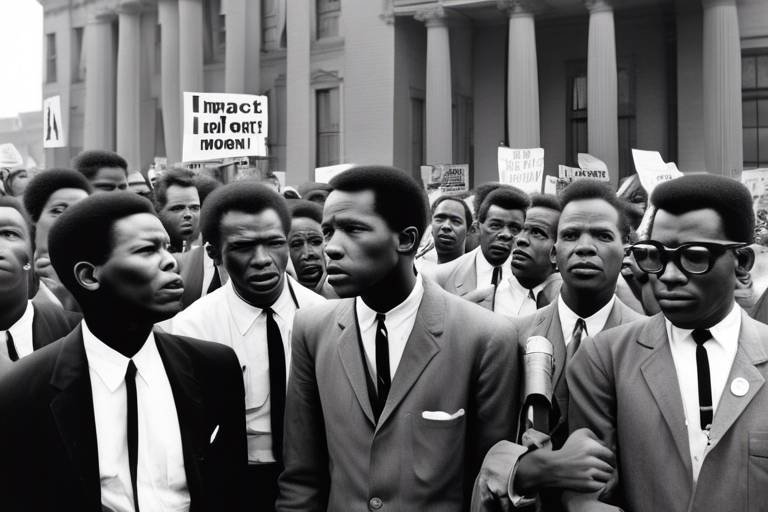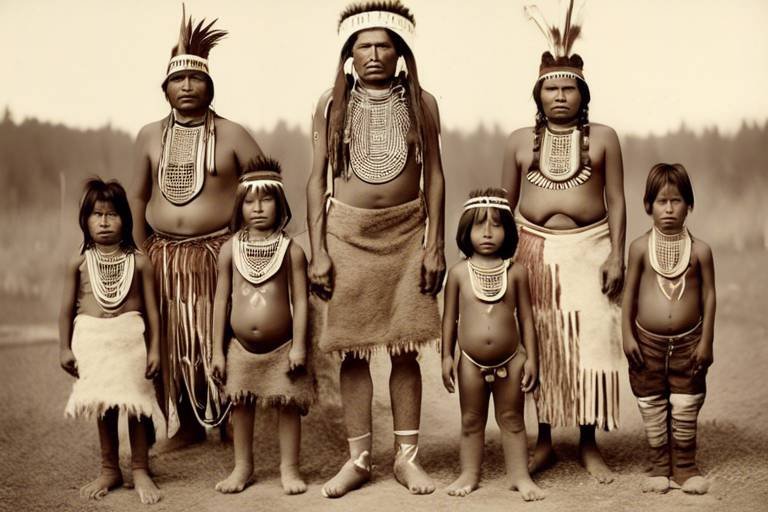The Rise of Social Movements in the 20th Century
Social movements in the 20th century have been like fireworks in the night sky, bursting with energy and color, captivating the attention of the world. These movements have been the catalysts for change, igniting flames of progress and sparking conversations that reverberate through history. From civil rights to environmental activism, each movement has left an indelible mark on society, shaping the way we live, think, and interact.
The civil rights movements of the 20th century stand as towering monuments of courage and resilience, challenging the status quo and demanding justice for marginalized communities. Leaders like Martin Luther King Jr. and Nelson Mandela emerged as beacons of hope, guiding their followers through the darkness of oppression towards the light of equality and freedom. The African American civil rights movement in the United States and the anti-apartheid movements in South Africa are testaments to the power of unity and determination in the face of adversity.
As the world awakened to the need for gender equality, feminist movements rose like phoenixes from the ashes of discrimination, advocating for women's rights and empowerment. These movements shattered glass ceilings, dismantled patriarchal structures, and redefined the role of women in society. From suffragettes to modern-day activists, feminists have fought tirelessly for reproductive rights, workplace equality, and social recognition, reshaping the fabric of our communities.
Labor movements thundered across the industrial landscape, demanding fair treatment, just wages, and safe working conditions for workers around the globe. The labor movement in the United States and the Trade Union movement in the UK were battlegrounds where the voices of the oppressed resonated like thunderclaps, echoing the call for dignity and respect in the workplace.
Environmental movements bloomed like wildflowers, spreading awareness about the urgent need to protect our planet from the ravages of human activity. Activists championed causes like climate change mitigation, conservation of natural resources, and promotion of sustainable practices. Their campaigns for environmental protection, renewable energy, and biodiversity preservation served as a wake-up call to a world teetering on the brink of ecological disaster.
Peace movements emerged as oases of calm in a world torn apart by conflict and violence, advocating for non-violence, disarmament, and peaceful coexistence. Anti-war protests, nuclear disarmament campaigns, and peacebuilding initiatives became beacons of hope in a sea of turmoil, offering a vision of a world where swords are turned into plowshares and nations walk hand in hand towards a future free from fear and aggression.
Student movements erupted like volcanoes on college campuses, challenging the status quo and demanding reforms in education, society, and politics. The student protests of the 1960s and contemporary student-led movements have been crucibles of change, forging a new generation of activists who refuse to accept the world as it is and strive to create a world as it should be.
Indigenous rights movements rose like mountains from the plains, asserting the rights of native peoples to their land, culture, and heritage. The struggles of the Native American civil rights movement and Maori activism in New Zealand echoed across continents, reminding the world of the resilience and spirit of indigenous communities in the face of colonization and oppression.
Global justice movements surged like tsunamis, challenging economic inequality, human rights violations, and social injustices on a global scale. Advocates for fair trade, debt relief, and social equity raised their voices in unison, demanding a world where justice is not a privilege but a right for all. These movements transcended borders and boundaries, uniting people in a common cause for a more just and equitable world.

Civil Rights Movements
Exploring the significant impact and evolution of social movements throughout the 20th century, from civil rights movements to environmental activism, and their role in shaping societal change and progress.
During the 20th century, civil rights movements emerged as powerful forces for change, challenging systemic discrimination and advocating for equality and justice. These movements were instrumental in reshaping societies and breaking down barriers that had long oppressed marginalized communities.
The African American civil rights movement in the United States stands out as one of the most influential movements of the century. Led by iconic figures like Martin Luther King Jr., Rosa Parks, and Malcolm X, this movement fought against racial segregation, discrimination, and disenfranchisement. The Montgomery Bus Boycott, the March on Washington, and the Selma to Montgomery marches are just a few examples of the pivotal events that defined this movement.
Similarly, anti-apartheid movements in South Africa played a crucial role in dismantling the oppressive apartheid regime. Figures like Nelson Mandela and Desmond Tutu led the charge against racial segregation and fought for the rights and dignity of all South Africans. The struggle against apartheid inspired global solidarity and highlighted the power of collective action in the face of injustice.
These civil rights movements paved the way for significant legislative changes, such as the Civil Rights Act of 1964 in the United States and the end of apartheid in South Africa. Their impact reverberated far beyond their respective countries, inspiring movements for equality and justice worldwide.
In essence, civil rights movements of the 20th century demonstrated the power of grassroots activism, nonviolent resistance, and unwavering determination in the face of adversity. They serve as a testament to the resilience and courage of individuals standing up for their rights and demanding a more just and equitable society.

Feminist Movements
Feminist movements have been instrumental in advocating for gender equality, women's rights, and reproductive rights across the globe. These movements have sparked crucial conversations and initiatives aimed at challenging societal norms and structures that perpetuate gender discrimination and inequality.
One of the key aspects of feminist movements is their multifaceted approach to addressing various issues affecting women. From fighting for equal pay and opportunities in the workforce to advocating for reproductive autonomy and ending gender-based violence, feminist movements have been at the forefront of pushing for tangible change.
Throughout history, feminist movements have brought attention to the importance of intersectionality, recognizing that women's experiences are shaped by factors such as race, class, sexuality, and disability. This inclusive approach has been vital in ensuring that the voices of all women are heard and represented in the fight for equality.
Moreover, feminist movements have played a significant role in influencing policy changes and legal reforms that promote gender equality. By organizing protests, campaigns, and advocacy efforts, feminists have been able to push for legislative changes that protect women's rights and advance gender justice.
Additionally, feminist movements have contributed to reshaping cultural narratives and challenging harmful stereotypes and representations of women in media, literature, and other cultural spheres. By promoting diverse and empowering portrayals of women, these movements have sought to create a more inclusive and equitable society for all.
Overall, feminist movements continue to be a driving force in the ongoing struggle for gender equality and women's empowerment. By mobilizing individuals, communities, and institutions, these movements strive to create a more just and equitable world where all individuals, regardless of gender, can thrive and fulfill their potential.

Labor Movements
Exploring the significant impact and evolution of social movements throughout the 20th century, from civil rights movements to environmental activism, and their role in shaping societal change and progress.
Examining the key events, leaders, and achievements of civil rights movements worldwide, including the African American civil rights movement in the United States and anti-apartheid movements in South Africa.
Discussing the emergence of feminist movements advocating for gender equality, women's rights, and reproductive rights, and their influence on social, political, and economic spheres globally.
When we dive into the history of labor movements, we uncover a tapestry of resilience and determination woven by workers fighting for their rights. These movements, such as the labor movement in the United States and the Trade Union movement in the UK, have been instrumental in securing fair wages, improved working conditions, and better treatment for workers. They have stood as a beacon of hope for those facing exploitation and injustice in the workplace, sparking change and setting precedents for labor laws and regulations.
Exploring the rise of environmental movements addressing issues like climate change, conservation, and sustainability, and their campaigns for environmental protection, renewable energy, and biodiversity preservation.
Examining peace movements advocating for non-violence, disarmament, and conflict resolution, including anti-war protests, nuclear disarmament campaigns, and peacebuilding initiatives around the world.
Investigating the role of student movements in advocating for educational reforms, social justice issues, and political change, such as the student protests of the 1960s and contemporary student-led movements.
Highlighting the struggles and achievements of indigenous rights movements fighting for land rights, cultural preservation, and recognition of indigenous peoples' rights, including the Native American civil rights movement and Maori activism in New Zealand.
Exploring the emergence of global justice movements addressing economic inequality, human rights violations, and social injustices on a global scale, and their calls for fair trade, debt relief, and social equity.

Environmental Movements
Exploring the significant impact and evolution of social movements throughout the 20th century, from civil rights movements to environmental activism, and their role in shaping societal change and progress.
The environmental movements of the 20th century have been instrumental in raising awareness about pressing issues like climate change, conservation, and sustainability. These movements have spearheaded campaigns for environmental protection, renewable energy, and biodiversity preservation, aiming to secure a healthier and more sustainable future for our planet.
One of the landmark achievements of environmental movements has been the push for governments and industries to adopt eco-friendly practices and policies. Through grassroots activism and advocacy efforts, environmental activists have successfully influenced policies and regulations to mitigate the impact of human activities on the environment.
Furthermore, environmental movements have played a crucial role in promoting environmental education and fostering a sense of environmental stewardship among individuals and communities. By organizing clean-up drives, tree planting initiatives, and educational workshops, these movements have empowered people to take action and make a positive impact on the environment.
Moreover, environmental movements have been at the forefront of promoting sustainable practices in various sectors, including agriculture, transportation, and energy production. By advocating for the transition to renewable energy sources, sustainable farming methods, and eco-friendly transportation options, these movements have paved the way for a greener and more sustainable future.
In addition to addressing local environmental issues, environmental movements have also championed global initiatives to combat climate change and protect endangered ecosystems. Through international collaborations and advocacy campaigns, these movements have called for collective action to address environmental challenges that transcend national boundaries.
The resilience and determination of environmental activists have been key drivers of change, inspiring individuals and communities to take a stand for the planet. By raising awareness, mobilizing support, and holding decision-makers accountable, environmental movements have demonstrated the power of collective action in driving positive environmental outcomes.

Peace Movements
Peace movements have played a crucial role in advocating for non-violence, disarmament, and conflict resolution on both local and global scales. These movements have been instrumental in promoting peaceful solutions to conflicts and fostering a culture of understanding and cooperation among nations.
One of the most notable aspects of peace movements is their dedication to anti-war protests, which aim to raise awareness about the devastating impact of armed conflicts and push for diplomatic solutions instead of resorting to violence. These movements often organize demonstrations, rallies, and marches to voice their opposition to war and call for peaceful resolutions to international disputes.
Additionally, peace movements have been actively involved in nuclear disarmament campaigns, advocating for the reduction and elimination of nuclear weapons to prevent the catastrophic consequences of a potential nuclear war. Through lobbying efforts, public awareness campaigns, and grassroots activism, these movements strive to create a world free from the threat of nuclear proliferation.
Moreover, peace movements engage in peacebuilding initiatives that focus on fostering reconciliation, dialogue, and cooperation among conflicting parties. By promoting dialogue and understanding, these movements aim to address the root causes of conflicts and build sustainable peace in war-torn regions.
Overall, peace movements serve as a powerful force for promoting peace, advocating for non-violence, and shaping a more harmonious and peaceful world for present and future generations.

Student Movements
Student movements have played a vital role in history, often serving as catalysts for social change and political reform. These movements have been at the forefront of advocating for educational reforms, addressing social justice issues, and pushing for political transformation. The student protests of the 1960s, for example, were iconic for their fervent calls for civil rights, anti-war sentiments, and youth empowerment.
One of the most significant aspects of student movements is their ability to mobilize young people around shared values and causes. These movements have been instrumental in raising awareness about pressing societal issues and challenging the status quo through peaceful demonstrations, sit-ins, and advocacy campaigns.
Moreover, student-led movements have been pivotal in shaping policy decisions and institutional changes. By amplifying their voices and demanding accountability from authorities, students have been able to influence educational policies, promote diversity and inclusion on campuses, and advocate for legislative reforms that benefit the youth and marginalized communities.
Today, student movements continue to evolve and adapt to contemporary challenges, including issues like climate change, gun violence, and social inequality. With the power of social media and digital activism, students are able to connect with like-minded individuals globally, organize protests and events, and amplify their messages to a wider audience.
Overall, student movements represent the energy, passion, and idealism of the youth, driving forward a vision of a more just and equitable society. Their impact transcends borders and generations, leaving a lasting imprint on the fabric of society and inspiring future generations to stand up for what they believe in.

Indigenous Rights Movements
Indigenous Rights Movements have been pivotal in advocating for the rights of indigenous communities worldwide. These movements have focused on various crucial aspects, including land rights, cultural preservation, and the recognition of indigenous peoples' rights. One notable example is the Native American civil rights movement, which fought against discrimination, land dispossession, and the violation of tribal treaties in the United States. Similarly, Maori activism in New Zealand has been instrumental in asserting Maori rights to land, language, and self-governance.

Global Justice Movements
Exploring the significant impact and evolution of social movements throughout the 20th century, from civil rights movements to environmental activism, and their role in shaping societal change and progress.
Examining the key events, leaders, and achievements of civil rights movements worldwide, including the African American civil rights movement in the United States and anti-apartheid movements in South Africa.
Discussing the emergence of feminist movements advocating for gender equality, women's rights, and reproductive rights, and their influence on social, political, and economic spheres globally.
Analyzing the labor movements that fought for workers' rights, fair wages, and improved working conditions, such as the labor movement in the United States and the Trade Union movement in the UK.
Exploring the rise of environmental movements addressing issues like climate change, conservation, and sustainability, and their campaigns for environmental protection, renewable energy, and biodiversity preservation.
Examining peace movements advocating for non-violence, disarmament, and conflict resolution, including anti-war protests, nuclear disarmament campaigns, and peacebuilding initiatives around the world.
Investigating the role of student movements in advocating for educational reforms, social justice issues, and political change, such as the student protests of the 1960s and contemporary student-led movements.
Highlighting the struggles and achievements of indigenous rights movements fighting for land rights, cultural preservation, and recognition of indigenous peoples' rights, including the Native American civil rights movement and Maori activism in New Zealand.
Exploring the emergence of global justice movements addressing economic inequality, human rights violations, and social injustices on a global scale, and their calls for fair trade, debt relief, and social equity.
Frequently Asked Questions
- What are social movements?
Social movements are collective efforts by a group of individuals who come together to bring about social, political, or cultural change. These movements often advocate for specific causes or address issues of injustice, inequality, or discrimination.
- What is the significance of social movements in the 20th century?
Social movements in the 20th century played a crucial role in challenging existing power structures, advocating for civil rights, gender equality, environmental protection, and other important issues. They have been instrumental in shaping societal norms, policies, and fostering positive change.
- How do social movements impact society?
Social movements can influence public opinion, raise awareness about pressing issues, mobilize communities, and push for legislative changes. They provide a platform for marginalized voices to be heard and contribute to the overall progress and evolution of society.
- What are some examples of successful social movements?
Examples of successful social movements include the Civil Rights Movement in the United States, the Women's Suffrage Movement, the Anti-Apartheid Movement in South Africa, the Environmental Movement advocating for conservation and sustainability, and the LGBTQ+ Rights Movement fighting for equality and acceptance.
- How can individuals get involved in social movements?
Individuals can get involved in social movements by participating in protests, signing petitions, volunteering for organizations, supporting advocacy campaigns, educating themselves on social issues, and using their voice to promote positive change within their communities.



















